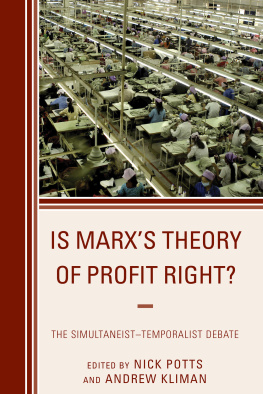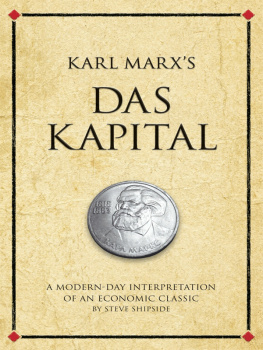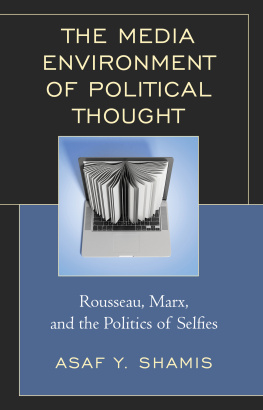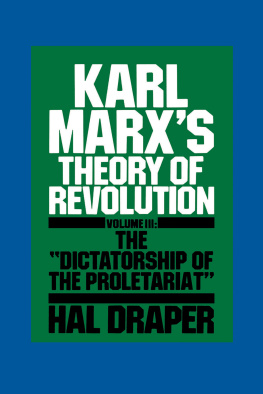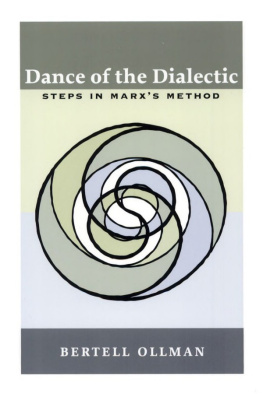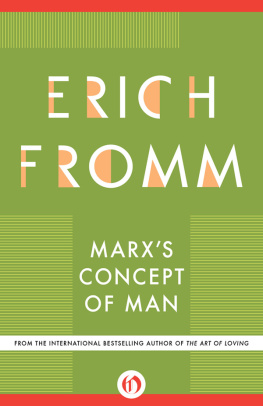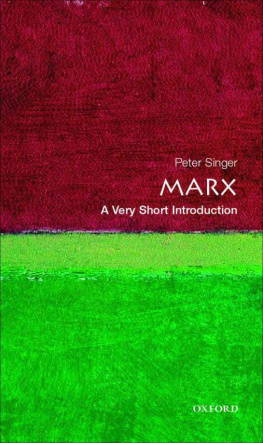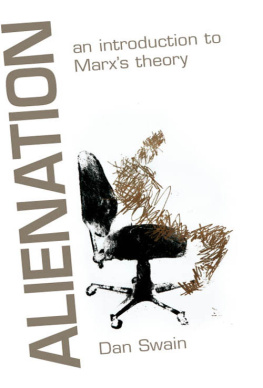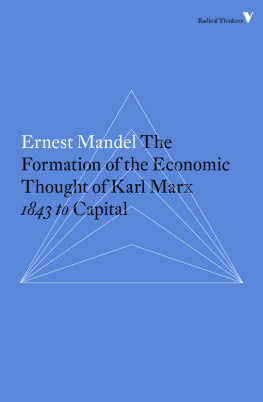1
THE CONCEPT OF ALIENATION
1 The young Marxs theory of alienation
In his essays and manuscripts of 1843 and 1844, the young Marx uses the terms Entfremdung (alienation or estrangement) and Entusserung (externalization or alienation) to refer to a great many things. Apparently, the point of this usage is to indicate a close connection in reality between the various things to which the terms are applied. The challenge is to discover what this connection is, and in what way the notion of alienation serves to represent it.
The terms Entfremdung and Entusserung themselves evoke images: they suggest the separation of things which naturally belong together, or the establishment of some relation of indifference or hostility between things which are properly in harmony. On the most obvious level, Marxs use of them expresses the idea that the phenomena he describes are characterized by abnormalities or dysfunctions which follow these general patterns. Moreover, we can see this quite clearly in some of the things to which Marx applies the concept of alienation. Workers are said to be deprived of, and hence alienated (separated) from their products; they stand in an alien (hostile) relation to the environment in which they work, and they experience the labor they perform as alien to them (indifferent or inimical to their natural human desires and aspirations).
All these phenomena, and more besides, are described by Marx as forms of alienation. In his early writings, and especially in his celebrated fragment Alienated Labor, Marx seems to be trying to argue that they are all merely aspects of a single system or whole, based on one paradigm form of alienation: alienated laboring activity. Thus he describes his task in this manuscript as one of comprehending ( begreifen ) the economic laws of modern society, grasping the intrinsic connection between them, by grasping the whole alienation to which they belong. Marx ostensibly proceeds to perform this task by formulating the facts of political economy in conceptual ( begrifflich ) terms as estranged, externalized labor. As the manuscript breaks off, Marx is in the midst of seeing further how the concept ( Begriff ) of estranged, externalized labor must express itself in actual life.
A great deal of paper and ink has been consumed in the attempt to spell out the theory of alienation hinted at in this early fragment. But I think to no avail; there are strong reasons to doubt there could be any such theory worth explicating. Insofar as the various phenomena to which Marx applies the concept of alienation fall under that concept, they have in common only that they seem to involve some kind of unnatural separation or hostile relationship. That they have this feature in common does little to suggest that there is any real connection between them or that they all arise from a single underlying cause. It is hard to believe that alienation (that is, unnatural separation or hostility) designates anything like a natural kind among human or social dysfunctions, and still harder to believe that it designates a concept or essence whose presence in human laboring activity explains all the various sorts of separation or hostility which we find in the phenomena to which Marx applies the notion of alienation.
Consider some of the claims made on behalf of Marxs system of alienation by its exponents. Istvan Meszaros, perhaps the most painstaking of them, declares that Marxs system of alienation and Both these statements, I submit, are simply preposterous. Marxs early writings are original, provocative, profound, rich in both social and philosophical insights. But they could be called rigorous only by someone who has little familiarity with the property that term denotes. The theory presented two decades later in Capital is undoubtedly a system, even one possessing a certain degree of rigor. But it certainly cannot be accurately described as a system of alienation. Whatever continuity there is between Marxs early and his later writings, there is no evidence that he ever thought of alienation as the basic idea of the Marxian system at any time after 1844. Meszaros very accurately describes the ideas of the Paris writings when he calls them a system in statu nascendi . But (to cite Hegel) neither a child nor a system is fully formed as soon as it is born; the idea which may have seemed basic to Marx in his first groping sketch of this theory may very well assume a very different, even peripheral role in more mature versions.
One prominent theme which Marx stresses is the alienation of human creations when they turn into hostile powers dominating or enslaving their human creators. Many writers have even identified the young Marxs concept of alienation with this theme. Marxs own emphasis (in the later as well as the early writings) supports the contention that this theme was central to his use of the terms Entfremdung and Entusserung . Moreover, such a notion of alienation is arguably less diffuse than the image or metaphor of unnatural separation. But even on this reading, the prospects are not bright for an explanatory theory of the sort adumbrated in the Alienated Labor manuscript. The sorts of human creations which Marx speaks of as alienated and dominating their creators are extremely varied in character, including not only material products of labor, but also social institutions and practices (such as the state and private property) and even thoughts and ideas (such as religious ones) to which no extramental reality corresponds. These items are not all human creations in the same sense (unless a rather slippery or rubbery one). And people are dominated in very diverse ways by religious illusions, by the state, and by their product in the form of capital. Once again, it is extravagant to suppose that positing something which turns on its creators and enslaves them designates a natural kind among human activities, or that all activities which this description can be made to fit are caused by some fundamental or paradigm activity. If Marxs theory is to be taken seriously, such suppositions must once again be defended by arguments of a sort which neither the young Marx nor his enthusiasts have produced.
Our doubts on this score are not relieved by the reasoning Marx uses when he does attempt to establish a connection between the different forms or manifestations of alienation. Alienation, he says,
shows itself not only in the result but in the act of production, in the producting activity itself. How could the laborer come to stand over against the product of his activity as something alien unless in the act of production itself he was alienating himself from himself? The product is only the resum of the activity of production. If the product of labor is externalization, then production itself must be active externalization, the externalization of activity, the activity of externalization.
Here Marx seems to be relying on some principle whose import is that the properties of an effect must always somehow pre-exist in the cause. But even the scholastics who endorsed this dubious idea restricted it only to the perfections in an effect, and alienation (whatever it is) is arguably not a perfection. If, moreover, we ignore the metaphysics of Marxs argument and examine the particular case in light of his other statements, it is difficult to make any sense of the explanatory claim he is making. Marx seems to be saying that alienation of the workers product must result from alienation in the activity which produces it. Now as Marx describes it, alienation of the product includes both the fact that workers do not appropriate or own the product of their labor, and the fact that they find themselves in servitude or bondage to it in the form of capital. The alienation of productive activity, on the other hand, consists in the fact that in labor the worker does not affirm himself but denies himself, feels not well off but unhappy, develops no free physical and spiritual energy but mortifies his physis and ruins his spirit. Thus Marxs apparent claim is that wage labors unpleasant and unfulfilling nature is what explains the fact that the workers product belongs to someone else. Likewise, the unappealing nature of labor is what causes this product to dominate the worker in the form of capital. Those who wish to defend the young Marxs theory of alienation must discover a way of reading its explanatory claims which saves them from being mere gibberish.


